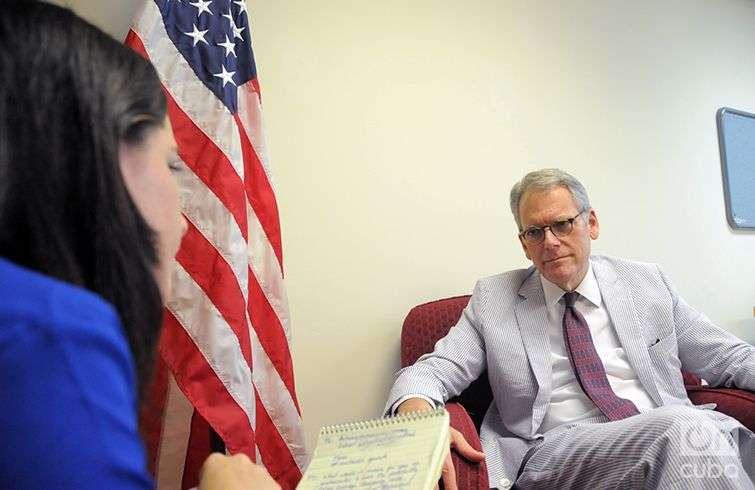“Our experience over the past year is that engagement and not isolation is the most effective way to promote U.S. interests and values in Cuba,” said U.S. Chargé d’Affairs Jeffrey DeLaurentis in a teleconference held on occasion of the first anniversary of the U.S.-Cuba rapprochement.
Talking from Havana, DeLaurentis mentioned some of the key areas in which both countries had been holding talks, namely, civil aviation, direct transportation of mail, the environment, regulatory changes, and counter-narcotics.
He noted that both parties had either reached understandings on those topics or continue to narrow their differences in ways that suggest they “could soon conclude such understandings.”
“A year ago, we had very limited engagement with the Cuban Government. Now we are in open conversation on issues that matter to the United States. With Cuba just 90 miles from our coast, it is imperative that we are able to have frank and open conversations with our neighbor and see progress in how we work together to combat transnational crime, protect our shared ecosystem, and create opportunities for the people in both nations to thrive.”
In the statement he read during the teleconference, DeLaurentis noted that progress had been made in relation to issues linked to the main goals announced by President Obama:
“One of the President’s goals in announcing the new approach to Cuba was to promote increased authorized travel, commerce, and the flow of information to the Cuban people.”
Some of the main accomplishments in that regard are:
– An increase in authorized travel by U.S. citizens by over 50 percent.
– Regulatory changes that help promote a Cuban private sector that now accounts for at least one in four Cuban workers.
– Cuba recently signed roaming agreements with two U.S. companies that promote the flow of information.
He noted, however that “more could be done on the Cuban side to take advantage of new openings.”
Disagreements
The diplomat also spoke of the issues in which both governments don’t see eye to eye, such as property claims, fugitives, and human rights.
“We have started the process of exchanging views with Cuba and expect to continue in the new year,” he said.
He said that his Administration had taken a number of steps to support a growing private sector in Cuba and strengthen people-to-people ties, and urged the Cuban Government to “make it less difficult for its citizens to start businesses, to engage in trade, and access information online.”
“Cuba’s future is for Cubans to shape,” he concluded, “but we will continue to encourage the Cuban Government to unleash and not constrain the potential of its citizens.”










